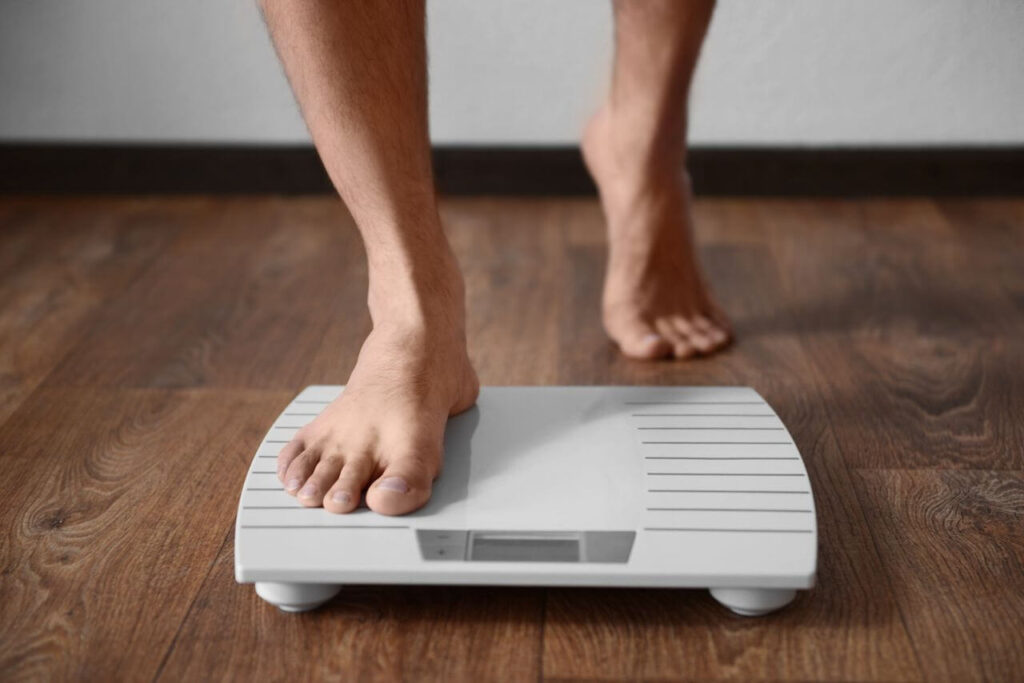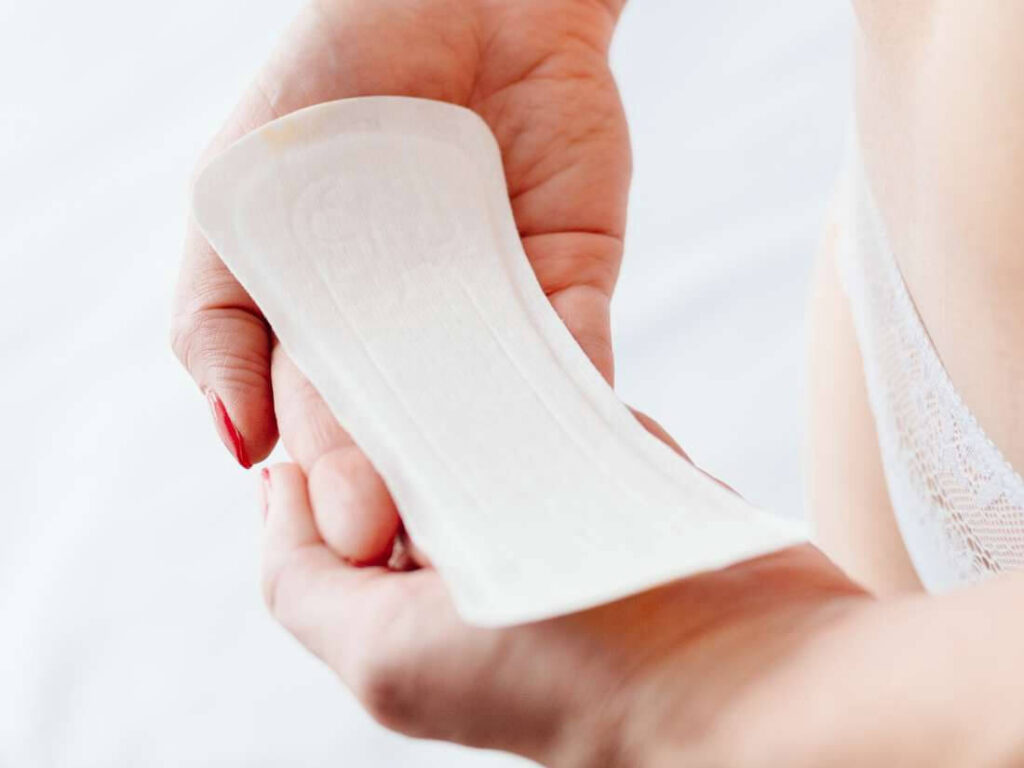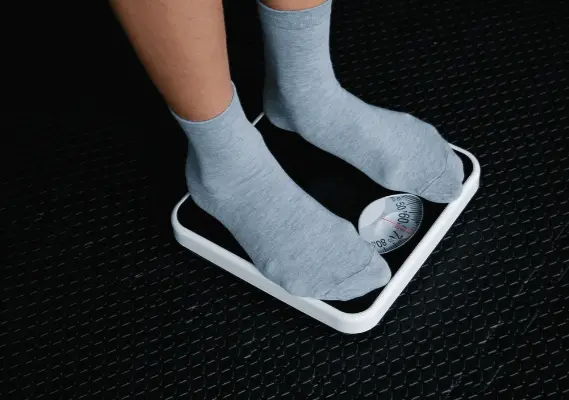Introduction
Is fluctuating weight normal? If you weigh yourself every morning, you’ve probably noticed that the number on the scale varies greatly from day to day.
The cause of daily weight fluctuations is not always clear. Perhaps you overate before night, resulting in weight increase, or you worked out hard, resulting in weight loss. However, there are a number of reasons why weight fluctuates from day to day.

If you’re trying to lose weight or change your body composition, you could think your daily weight swings are caused by fat loss or an increase. That is an option. However, there are a plethora of additional elements that influence your weight on a regular basis.
Most people have a five-pound weight fluctuation on a daily basis, according to endocrinologist Kathleen Wyne, MD, but the figure on the scale can move by up to 20 pounds depending on your body size.
Weight Fluctuation From Sodium
A high-salt diet can help with water retention. On the scale, the extra water weighs pounds. Some people are more sensitive to salt than others, and as a result, they may retain more water.
Many of us rarely use the salt shaker at meals. Salt, on the other hand, can be found in unexpected places. Cold meats, frozen meals, and savory sauces often have high sodium levels. Canned soup is another common culprit. Many low-calorie soups contain a lot of salt.

Even homemade soups may include a lot of salt. If you try to cut back on large meals and replace one with low-calorie soup, you may gain weight, even if it’s only water retention.
Weight Fluctuation From Carbohydrates
If you favour bread, pasta, rice, and other starchy carbs, your weight gain could be due to carbohydrate consumption. To store the fuel source, your body retains approximately three grammes of water for every gramme of carbohydrate consumed.
As a result, if you consume a lot of carbohydrates, your body weight will most likely increase due to water weight rather than fat weight. In addition, many refined carbohydrate diets are high in salt.

A spaghetti and meatball dish with Parmesan cheese, for example, may lead you to retain water due to the high carbohydrate and salt content.
Weight Fluctuation From Bowel Movements
Changes in the scale are frequently caused by bowel motions. What is the weight of your poop? In a study, researchers showed that you can produce 125 to nearly 170 grams of stool per day. This is less than a half-pound of feces.
According to other studies, the average daily stool weight is 106 grams or less than a quarter pound. Some sources claim that you can poop up to one ounce every day for every 12 pounds of body weight.
Even if your stool weight reduces, digestible stuff will stay in transit. The usual physiological fecal transit time is believed to be between 40 and 60 hours, with an optimal whole gut transit time of 24-48 hours.
Weight Fluctuation From Medication
Some medications may promote weight gain. According to the Obesity Action Coalition, some may lead you to retain water, while others “may impact how your body absorbs and stores glucose, which may contribute to fat deposits in your abdomen” (OAC).

You may gain several pounds each month if you use medicine to treat diabetes, high blood pressure, mood disorders, seizures, or migraines. “Some people may gain a few pounds over the course of a year, while others may gain ten, twenty, or more pounds in just a few months,” according to the OAC.
Weight Fluctuation From Your Menstrual Cycle
Bloating is common in women as a result of fluid retention before and throughout their menstrual cycle. According to studies, fluid retention increases on the first day of menstruation. It is lowest during the mid-follicular cycle and gradually increases over the eleven days preceding ovulation.
Some studies revealed that fluid retention was unrelated to changes in ovarian hormones. However, another study has linked increases in estradiol and progesterone (your ovarian hormones) to changes in binge and emotional eating.

Although hormonal changes may not cause weight gain, the cravings you have prior to your period may urge you to consume more or different foods than you would typically eat, resulting in increased fluid retention and possibly weight gain from food and exercise.
Weight Fluctuation From Alcohol
Because alcohol is a diuretic, if you urinate more than usual while drinking, you may lose weight suddenly. In fact, alcohol can increase urine flow within 20 minutes of ingestion, resulting in urinary fluid losses and potential fluid imbalance.
This imbalance, however, may cause your body to retain fluids from the liquids and meals you consume. Many alcoholics consume or over-consume salty foods, which promote water retention. As a result, gaining weight after drinking is extremely likely.
Weight Fluctuation From Exercise
Exercise can produce sweating and water weight loss. The average person loses 25 to 45 ounces of fluid per hour during exercise, especially in severe cardiovascular activity, according to fitness experts.
Of course, the amount can vary greatly depending on the weather and other factors. Sweating fluids should also have no influence on the scale. Why? Fluids lost during physical exertion must be replaced.

Other sorts of exercise may also induce weight swings on a daily basis. Muscle water retention can be caused by weight lifting and other forms of strength training. What’s the story here? Weight lifting produces microscopic rips in the muscle. Your muscles store and use water to heal the injury.
Weight Fluctuation From Food Weight
Eating causes your weight to climb somewhat while your body processes the meal. Each day, the amount of food ingested might range from a few ounces at each meal to several pounds. Dietary water consumption may also contribute to weight gain.
According to some experts, drinking two cups of water (beverages or water with meals) will increase your weight by one pound.
It will not stick to your thighs on its own. Food calories are either expended or stored by your body for later use. Urine and feces are waste products released by the body (bowel movements).
Weight Fluctuation From Illness
Your weight may fluctuate as a result of an illness, such as the flu, or a persistent ailment.
While hypothyroidism, Cushing syndrome, and polycystic ovarian syndrome can all result in unexpected weight gain, diabetes, and Crohn’s disease are more likely to result in unexpected weight loss.

Consult a doctor if you have any more unusual symptoms or if you have a verified underlying condition. They can inform you if your symptoms are the result of an underlying condition and guide you through the following steps.
When is the most appropriate moment to weigh yourself?
When measuring oneself, be consistent. When you wake up and empty your bladder, you will have your lowest weight of the day. You can weigh yourself at any time of day, but to acquire an accurate measurement, you must continue to weigh yourself on the same scale at that time.
If you want to know how much your typical weight fluctuates
Weighing yourself throughout the day will not calculate the total pounds gained or lost, but it will help you estimate the amount of weight fluctuation you experience during the day. Weigh yourself in the morning, afternoon, and evening to get a sense of how your weight swings.
If you want to lose 2–3 pounds
Weigh yourself at the same time of day and under the same settings, such as with your shoes off, to see if you’ve lost any true weight.
You will lose weight if you burn more calories than you consume. Losing a small amount of weight will almost probably need more self-control than usual. Cutting out extra snacks or decreasing your portion size may help you lose a few pounds in the next week or two.
If you want to lose more than 3 pounds
Using your daily base weight, you can calculate any amount of weight loss. Daily weigh-ins, according to one 2013 study, can aid in significant weight loss. Physical activity and diet were also taken into account in the study.
Remember that to reduce weight, you must either burn more energy or consume less energy (calories). Losing 1 to 2 pounds per week is typically seen as a healthy strategy.
How to Evaluate Yourself
The key to determining your starting weight is consistency. Here are some rules to follow when estimating your daily weight:
As your primary method, use a scale.
Every day, weigh yourself accurately and on the same scale. To avoid false readings, place the scale on a level, hard surface.
Weigh yourself every day at the same time.
Try to weigh yourself every day at the same time. It is normal to weigh yourself first thing in the morning after using the restroom.
Experiment with and without clothing.
Try weighing yourself in your underpants or naked. Because the weight of your apparel varies, so will the number on the scale.
Other safeguards should be taken as well.
Other than the scale, there are several methods for determining your body composition and total weight. The way your clothes fit you could help you determine weight fluctuation. Measuring the circumference of your waist, arms, and other body parts may reveal information about how your body is changing.
Physical size is not the only factor to consider when assessing your overall health. Your fitness level can be determined by measuring your heart rate while resting and during aerobic activity, for example. Counting reps can help you assess your strength, whereas stretching to your limits can help you assess your flexibility.
Conclusion
Weight fluctuations on a daily or weekly basis are common and should not be the reason for alarm.
However, if your weight fluctuates by more than 6 pounds in any direction over a six-month period, you should see a doctor or other healthcare professional.
This could be a side effect of a medication you’re taking, or it could be a sign of a more serious health issue.
